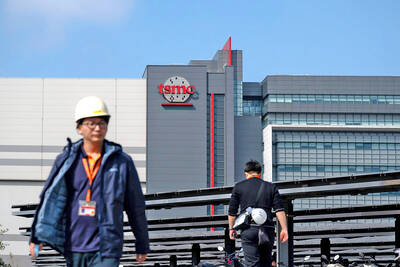Luxgen Motor Co Ltd (納智捷) yesterday launched its first subcompact crossover SUV model.
Luxgen — a Yulon Motor Co (裕隆汽車) brand — said that new model U5 is equipped with augmented-reality (AR) technology and has six camera lenses to help eliminate blind spots.
“The U5’s safety equipment is very diversified,” Luxgen president Tsay Wen-rong (蔡文榮) said at a launch event for the model, citing systems of electronic stability control and traction control.
The model has passed the frontal and side collision test based on Taiwan’s vehicle safety regulation in Spain, despite that Luxgen does not sell U5 cars in Europe, a company official said by telephone, adding that the performance was much better than expected.
The test was conducted by IDIADA, a vehicle crash test lab authorized by Taiwan’s Vehicle Safety Certification Center (VSCC), Luxgen said.
IDIADA is also one of the seven official test house of Euro NCAP, a European car safety performance assessment programme that rates cars sold in the EU market through a series of vehicle tests.
With the U5 priced between NT$659,000 and NT$789,000 (US$21,870.44 and US$26184.8), lower than its rivals, Luxgen has received more than 1,500 preorders since last month, Tsay said.
The better-than-expected demand could help the company reach its sales target of 18,000 cars in Taiwan and China this year, Luxgen said.
Over the first eight months of this year, Luxgen sold 8,800 cars in Taiwan.
It declined to give a number for its sales in China, but said it would introduce the U5 to China next month.
The U5 launch is part of the company’s mid-term plan to introduce 10 new models over the coming five years, Luxgen said.
Yulon’s board in June approved a plan to set up a sales firm in China for 600 million yuan (US$91.11 million) to take full control of Luxgen’s marketing business in that nation, according to the company’s filing with the Taiwan Stock Exchange at the time.
Dongfeng Yulon Motor Co (東風裕隆), Yulon’s joint venture with China’s Dongfeng Automobile Co (東風汽車), has been responsible for selling and manufacturing Luxgen cars in China, but it will focus solely on manufacturing in the future, Yulon said.
Luxgen introduced an upgraded version of U6 compact crossover in the first half of this year, and Yulon hopes the launches of the two new Luxgen models will boost its sales and earnings.
From January through last month, Yulon reported that cumulative revenue declined 15.54 percent from a year ago to NT$63.25 billion, mainly due to fierce competition in the Chinese market.
This story has been updated since it was first published.

Apple Inc has closed in on an agreement with OpenAI to use the start-up’s technology on the iPhone, part of a broader push to bring artificial intelligence (AI) features to its devices, people familiar with the matter said. The two sides have been finalizing terms for a pact to use ChatGPT features in Apple’s iOS 18, the next iPhone operating system, said the people, who asked not to be identified because the situation is private. Apple also has held talks with Alphabet Inc’s Google about licensing its Gemini chatbot. Those discussions have not led to an agreement, but are ongoing. An OpenAI

INSATIABLE: Almost all AI innovators are working with the chipmaker to address the rapidly growing AI-related demand for energy-efficient computing power, the CEO said Taiwan Semiconductor Manufacturing Co (TSMC, 台積電) yesterday reported about 60 percent annual growth in revenue for last month, benefiting from rapidly growing demand for artificial intelligence (AI) and high-performance computing applications. Revenue last month expanded to NT$236.02 billion (US$7.28 billion), compared with NT$147.9 billion in April last year, the second-highest level in company history, TSMC said in a statement. On a monthly basis, revenue surged 20.9 percent, from NT$195.21 billion in March. As AI-related applications continue to show strong growth, TSMC expects revenue to expand about 27.6 percent year-on-year during the current quarter to between US$19.6 billion and US$20.4 billion. That would

‘FULL SUPPORT’: Kumamoto Governor Takashi Kimura said he hopes more companies would settle in the prefecture to create an area similar to Taiwan’s Hsinchu Science Park The newly elected governor of Japan’s Kumamoto Prefecture said he is ready to ensure wide-ranging support to woo Taiwan Semiconductor Manufacturing Co (TSMC, 台積電) to build its third Japanese chip factory there. Concerns of groundwater shortages when TSMC’s two plants begin operations in the prefecture’s Kikuyo have spurred discussions about the possibility of tapping unused dam water, Kumamoto Governor Takashi Kimura said in an interview on Saturday. While Kimura said talks about a third plant have yet to occur, Bloomberg had reported TSMC is already considering its third Japanese fab — also in Kumamoto — which would make more advanced chips. “We are

KEY TECHNOLOGY: South Korea’s semiconductor exports reached US$11.7 billion in March, and the chip sector accounts for one-fifth of the nation’s total exports South Korea would set up an aid package worth more than US$7 billion to support its chip industry, the South Korean Ministry of Economy and Finance said yesterday. This initiative follows its pledge last year to build the world’s largest chip center using US$240 billion of private investment, primarily from Samsung Electronics Co, the world’s largest memorychip maker, as it seeks an edge in the global industry. Seoul “is preparing an assistance package of more than 10 trillion won (US$7.3 billion) to support fabless, chips materials and manufacturing equipment in all areas of chips industry,” South Korean Minister of Economy and Finance